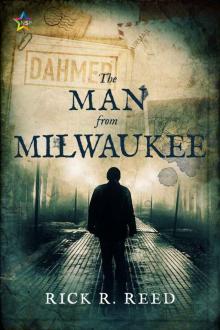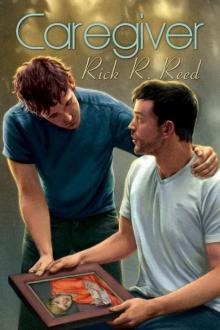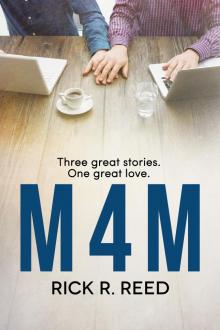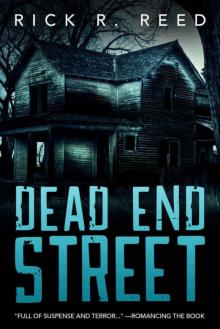- Home
- Rick R. Reed
The Man From Milwaukee Page 8
The Man From Milwaukee Read online
Page 8
Emory had done his best to take care of Mother, seeing to her hygiene and getting some food and liquids down her when she could tolerate it. Mary Helen knew she should offer more help than she did, but the sight of their once-vibrant mother lying amid soiled sheets and not recognizing Mary Helen was simply too much. She didn’t want to be cruel and uncaring, but it was all she could be, in light of the circumstances. It was an act of self-protection. She hated herself for the weakness, but what could she do?
And she hated that Emory was so lonely. She could see that he struggled with his feelings about being gay (Mary Helen could admit it, even if her brother couldn’t).
In the end, after the cremation, Mary Helen had only wanted to escape, to flee her depressing surroundings. Liz had been bugging her to move in with her ever since they first started dating, back around the new year, but Mary Helen never felt that she should. Liz was much older, attentive, and kind, but Mary Helen never felt a spark with her.
And now, here she was, in bed with her, the TV on, a dog taking up too much space next to her, and Liz’s portable TV running the eleven o’clock news on channel two.
Mary Helen slumped back against her pillow, edging closer to Liz, not to cuddle, but to give herself a little more space than Zorro allowed.
The news was on low. The voice of the anchor was a low rumble, making Mary Helen think of the teacher in the Charlie Brown specials on TV.
“Wait a minute.” Liz said, aiming the remote at the TV and sitting up straighter in bed. Her eyebrows came together with concern. Mary Helen tuned in more.
There was a picture of a handsome young man behind the newscaster who was providing details about his murder. His body had been discovered early that morning in an alley behind the Forge bar, in the Edgewater neighborhood. Mary Helen’s stomach turned as the newscaster described how he’d bled out in the alley, due to blunt force trauma to the skull.
“Oh my God,” Mary Helen whispered. “That’s right around the corner from where I lived.”
Liz glanced over at her. She shut the TV off. “And I knew that guy.”
“You did?”
Liz nodded. “We used to volunteer together at the Howard Brown clinic. He was a nice guy, maybe a little too promiscuous, but aren’t all the men?” She shook her head. “What a horrible way to die. I wonder what happened?”
“You mean what he was doing in an alley in the wee small hours? I think we can guess.” Mary Helen wished she could take back the words. They weren’t fair. They were character assassination with no grounding in reality. “I’m sorry. He might have just been passing through the alley on his way home after his shift. Maybe he needed to piss. He might have been pulled off the street into that alley by the killer.” Mary Helen shivered and recalled a time when she was walking home from work after dark, and a thug wearing a ski mask had yanked her into a parking garage beneath an apartment building. He flung her to the ground, and God only knew what was in store for her. She was saved by someone calling out from a building across the street. The thug took only her purse, leaving her a concussion and a lacerated tongue caused by her biting down when she struck her head.
“Ah, Eric got around, that’s for sure. I wouldn’t be surprised if he was hooking up with one of his tricks in that alley. Maybe that’s who killed him. Someone who got his jollies, and then, afterwards, decided to go back to the self-loathing. Maybe they thought they could stamp out their own desires by killing a fag. Isn’t that what this Dahmer was doing?”
Mary Helen felt the old pull she’d felt so long as she watched her mother die—the urge to flee.
“I don’t want to talk about this anymore. But I’ll say this: that Dahmer guy? I think his problem wasn’t self-loathing. It was loneliness. I heard he killed those boys to keep them with him, in a way.” Mary Helen shut out, very quickly, the gruesome thoughts of dismemberment and cannibalism that rose up.
“Oh, who knows why he did anything? He’s sick. And nuts. Glad he’s behind bars.”
Mary Helen put out her cigarette and rolled over, away from Liz. She found herself putting her arms around Zorro and drawing him close.
And she thought of Emory. Lonely Emory. Lonely Emory, who couldn’t accept who he was even though Mary Helen had clocked him as gay when they were children and he would play Barbies with her or create elaborate fashion drawings at her request.
Or the way he seemed to have no friends at all in the neighborhood, save for the little sister he adored.
He’d endured more than his fair share of bullying for his adoration of a little girl as they grew up.
And the worst part was that Mary Helen herself, as they grew, pulled away from her odd brother too.
That, she was sure, hurt him even more than schoolyard taunts and worse.
Her not standing by him had been the ultimate betrayal.
She wondered if he knew about the murdered bartender. Had he seen anything? Did the murder, so close to him, frighten him?
Maybe she’d call him. Maybe she’d stop by, check in on him. She should.
She fell asleep with good intentions.
She woke with them all forgotten.
Part Two
Winter
Chapter Eight
Tyler made his way over a bridge above the Chicago River. He was headed to work on this early February morning. The city’s towers rose all around him, holding up a sagging whitish sky, pregnant with even more snow. It would begin falling, Tyler predicted, before he got to his lunch break, adding to the grayish, slushy mess already in the streets. He could smell it in the bitter wind. His face burned, frozen; the snot in his nose crackled when he drew in a breath. His eyes stung.
Like everyone else on that bridge that morning, he was unidentifiable, hunched against the wind and buried under scarf, gloves and a down-filled coat. Even with all of that—plus corduroys and a Land’s End Ragg wool sweater underneath—he was freezing his ass off. His teeth chattered, steam poured out of his mouth and nostrils with every exhalation, and he wondered why he continued to live in this arctic city.
He paused in front of a little diner just a few doors up from the high-rise building that housed Quality Investigations. He could hardly believe he was coming up on six months of employment. It seemed like only yesterday he was just starting. Is this where he’d be trapped? Tapping out underwriting reports for the rest of his days in a kind of cubicle-locked purgatory? Was this how most people ended up? In dead-end jobs, never mind careers, where complacency made a person suddenly wake up and see that they’d squandered a lifetime?
He peered inside the steamed-up glass of the diner. A Formica-topped counter ran along the front of the restaurant with red leatherette stools. It had the standard black-and-white-checked tile floors. Booths opposite the counter. Behind it, a short-order cook presided over his domain, flipping eggs, bacon, and hash browns on a flattop grill. Tyler wondered why he’d never ventured inside.
He glanced down at his watch. He was early today by a half hour or so—enough time to go in and warm up with a coffee and maybe a cinnamon roll or breakfast sandwich.
He yanked open the door and breathed a sigh of blessed relief at the welcome rush of warmth immediately surrounding him. He thawed and water dripped from his outer garments.
A red-haired waitress in a harvest-gold nylon uniform shot him a world-weary smile. She reminded him of the waitress on the cover of the Supertramp album he’d had in high school—a living, breathing cliché with Aqua Net, blue eye shadow, and orthopedic shoes.
“Sit anywhere you like, hon. I’ll be with you in two shakes of a lamb’s tail.”
Tyler had to laugh. Was she really like this? Or being ironic? Playing the waitress part?
He didn’t know, and it didn’t matter. He climbed up on a stool and pulled out one of the vinyl-covered menus in between a sugar dispenser and a paper-napkin holder. He knew what he wanted, but it seemed like the right thing to do.
In a couple of minutes, or two shakes, she was before hi
m, pencil poised above her pad. “Hi, hon, I’m Emma, and I’ll be taking care of you. Get you some coffee to warm up?” She glanced out the window. “I heard it was twenty below with the wind chill.” She shivered.
“Coffee would be great.”
She started away and Tyler called after her, “And can you do a couple of poached eggs on toast?”
She grinned, as though reading his mind. “Want the yolks broken?”
He nodded.
She called over her shoulder to the short-order cook, a man Tyler thought was imported directly from central casting because he looked so much like Vic Tayback from Alice Doesn’t Live Here Anymore. “Adam and Eve on a raft—wreck ’em!”
No one laughed, and Tyler assumed he’d fallen into The Twilight Zone territory.
Emma reached down below the counter and pulled up that day’s copy of the Chicago Tribune. “Eggs’ll be up real quick, sweetie. You wanna read the paper while you wait?”
Tyler was going to say no because he really didn’t have time for a leisurely breakfast, but he took the paper anyway, mainly because he thought Emma, for some unidentifiable reason, would be offended if he said no.
The day’s top story on the front page caught his eye. The serial killer and cannibal, Jeffrey Dahmer’s, trial was wrapping up. Only yesterday, forensic psychiatrist Park Dietz, had testified and said that Dahmer wasn’t suffering from any mental illness. Right. The things he did? And he’s not suffering from mental illness? Tyler shivered. The forensic psychiatrist backed that up with the claim that Dahmer “had gone to great lengths to be alone with his victim and to have no witnesses.” There was more than enough evidence that Dahmer prepared for each murder, therefore. “His crimes were not impulsive.”
And that makes him sane?
Dietz had gone on to testify that, although Dahmer was often intoxicated when he was with his victims, “If he had a compulsion to kill, he would not have to drink alcohol. He had to drink alcohol to overcome his inhibition, to do the crime which he would rather not do.” Dietz also said Dahmer identified with evil and corrupt characters from Return of the Jedi and The Exorcist III, pointing out the power held by some of the characters in these movies. Dahmer would actually watch the two films before seeking out a victim. Dietz diagnosed Dahmer with “substance use disorder, paraphilia, and schizotypal personality disorder.”
Tyler shoved the paper aside. Put whatever label you want on him. I’m kind of partial to nutcase and monster.
His eggs arrived, their yolks spilling out onto buttered white toast.
Tyler’s appetite suddenly vanished. He caught Emma’s eye and again felt an irrational fear about offending her, so he asked, “I didn’t realize I have a meeting to get to. Can you make my order to go? If it isn’t too much trouble?” He smiled what he hoped was a winning smile.
She began gathering up the plate, the cup of coffee. “Sure thing, hon.” She set the stuff on the counter behind her, tallied up his check, and then put that in front of him.
Tyler took cash out of his wallet, making sure to leave a big tip for Emma.
She was back “in a jiff” with a Styrofoam box and his coffee poured into a matching cup with a plastic lid. “There you go. Don’t work too hard today.” She winked.
“I’ll try my best.” Tyler hopped down from the stool and then gathered up his takeout.
“See you tomorrow!” Emma called.
“Right.”
She held up the paper. “You want to take this with you?”
Just looking at the paper with its headline about Dahmer made him shiver once more. “That’s okay.”
He hurried out. There was a homeless man dressed in an old Army jacket and fingerless gloves shivering just outside his office building entrance. Smiling, Tyler handed him the food and the coffee. The man looked down at the containers and then back up at Tyler. “Bless you, man.”
Tyler hurried through the revolving doors. As he waited for the elevator, he wondered what Emory would have to say about the latest news on Dahmer. Emory was like Tyler’s dad with the Cubs, endlessly fascinated and, yes, oddly, endlessly in thrall, almost as though he were rooting for the killer cannibal’s eventual triumph. Emory claimed he corresponded with the killer, but Tyler knew he had to be lying.
He’d gotten to know Emory a lot better over the past few months and the association hadn’t always been easy. In fact, as Tyler rode up in the elevator to their floor, he marveled once again how close he’d come to the shy young man.
They’d had a very rocky start, with Emory pushing Tyler away every time Tyler would come close, whether that nearness was literal or figurative. What allowed them to find some sort of common ground was Dahmer and Tyler’s love of horror movies and novels.
Tyler would have guessed his outpouring of sympathy over the loss of Emory’s mother would have been the trigger to draw them closer, but although Emory seemed to appreciate the flowers and visits, the expressions and inquiries of concern and compassion, it was nightmare territory that actually brought them together.
Tyler paused just outside the elevator doors to recall that moment in the lunchroom, only the week before, when they seemed to strike a sort of accord.
I crept up behind him and glanced over his shoulder. For once, he was reading a newspaper that wasn’t local. This was an obviously used edition of The New York Times someone had left behind on one of the tables. The headline read, “Jury Hears How Unruffled Dahmer Dodged Arrest.”
The subject had come up between us before, quite a lot. Emory seemed to be up-to-date on all the latest news on Dahmer’s confinement in prison, his trial, and certainly the dark deeds he perpetrated.
“Good reading?” I’d asked and it caused Emory to jump and let out a little cry of alarm.
I sat down beside him and pulled out a tuna salad sandwich from a brown paper bag. “Sorry, didn’t mean to scare you.”
Emory turned the newspaper over so the story about Dahmer wasn’t face up. “It’s okay,” he said.
We ate in silence for a few minutes, and then I asked, “Any new stuff on him?”
“Well—” Emory slouched back in his seat, and I could tell he was ready to talk. He was always ready to talk about Dahmer. It was freaky, but it made Emory more interesting than 99 percent of the folks who work here. “There’s nothing new to me. As you know, I’ve been following his case ever since it first was in the paper last July.” He shut his eyes, and I had to imagine he was recalling—and maybe relishing—hearing the first details right after Dahmer got caught last summer. “But there’s stuff here the public might not be aware of.”
“Like what?” I asked.
“Like how he almost got caught after killing one of his first victims.”
“Really? How long ago was that?” I asked, thinking that this must have been a fairly recent development, within the past five years anyway, in Milwaukee—or shiver—even here in Chicago. But Emory surprised me.
“He was only eighteen. So was his victim, a guy named Steven Hicks.” Emory went on to tell me all the gruesome details, how he bludgeoned the poor guy with a dumbbell after a night of drinking at Dahmer’s parents’ house in Ohio. He then strangled him with that same dumbbell. Later, he dissected and dissolved the body with acid.
“Sick.” I pushed my half-eaten sandwich away.
“Wanna hear the kicker?”
I wasn’t sure I did, but I nodded anyway. “Dahmer got pulled over by the cops with the guy in a trash bag in his car. He told him he was just going to the dump. They believed him. Can you imagine?”
Well, in retrospect, it seemed like a horrible lapse in judgment, but at the time, in small-town Ohio, a local patrolman might not jump to the conclusion that some kid was driving around with a dead body in a plastic garbage bag. Really. Would you jump to murder and dismemberment first thing?
“Wow. If they’d stopped him back then, looked inside the bag, they might have prevented who knows how many deaths?”
“At least fifteen,�
� Emory said softly. “Although I know there were more.”
“Why do you think he did it?”
That was always the big question.
Emory looked at me for a long time, and I could tell from the concentration on his face that he knew the answer or at least thought he did. “He wanted him, just like all the others, to stay with him.”
I nodded. I’d read that too. That his killing victims, and even eating parts of them, was a way of keeping them with him.
“There are better ways,” I said, pointing out what I thought was the obvious.
“Maybe he didn’t see things through your sane and rational eyes,” Emory replied.
I was weirdly complimented. And the fact that I thought so made me think I might have some of the same weirdness as Emory.
He’s just fascinated by all of this because he’s lonely. And hurting. I thought. That was all it always boiled down to, which is why I never felt repelled by Emory, who despite his fascination with Dahmer, seemed so sweet, so desperate for human connection. He lived alone in his apartment near Loyola, his sister having pretty much abandoned him after his mom passed.
It was this last thought that made me throw out a proposition. I knew he was not only lonely and alone, but poor. It was hard for him to make ends meet, though somehow, he was keeping his head barely above water.
“Hey, what are you doing tonight?”
Emory grinned, but there was no joy, no mirth in it. “Same old, same old. Home. Lean Cuisine. A little TV and then bed. Get up and start it all over again in the morning.”
I shoved the remains of my lunch back in the sack and offered, “Why don’t I come home with you? We can order a pizza from Giordano’s and maybe check out what’s on offer at Blockbuster. Something gory.”
“I don’t know,” Emory said, but I could tell he was tempted.
“Come on. You just said you had literally nothing to do tonight.”

 Big Love
Big Love Blue Umbrella Sky
Blue Umbrella Sky The Man From Milwaukee
The Man From Milwaukee Unraveling
Unraveling Penance
Penance Husband Hunters
Husband Hunters Caregiver
Caregiver Superstar
Superstar Beau and the Beast
Beau and the Beast Obsessed
Obsessed Bigger Love
Bigger Love M4M
M4M I Heart Boston Terriers
I Heart Boston Terriers Dinner at Jack's
Dinner at Jack's A Dangerous Game
A Dangerous Game An Open Window
An Open Window Dinner at Fiorello’s
Dinner at Fiorello’s The Perils of Intimacy
The Perils of Intimacy Orientation
Orientation Dinner at the Blue Moon Cafe
Dinner at the Blue Moon Cafe High Risk
High Risk Sky Full of Mysteries
Sky Full of Mysteries Dead End Street
Dead End Street Crime Scene
Crime Scene Fugue
Fugue Blink
Blink Lost and Found
Lost and Found